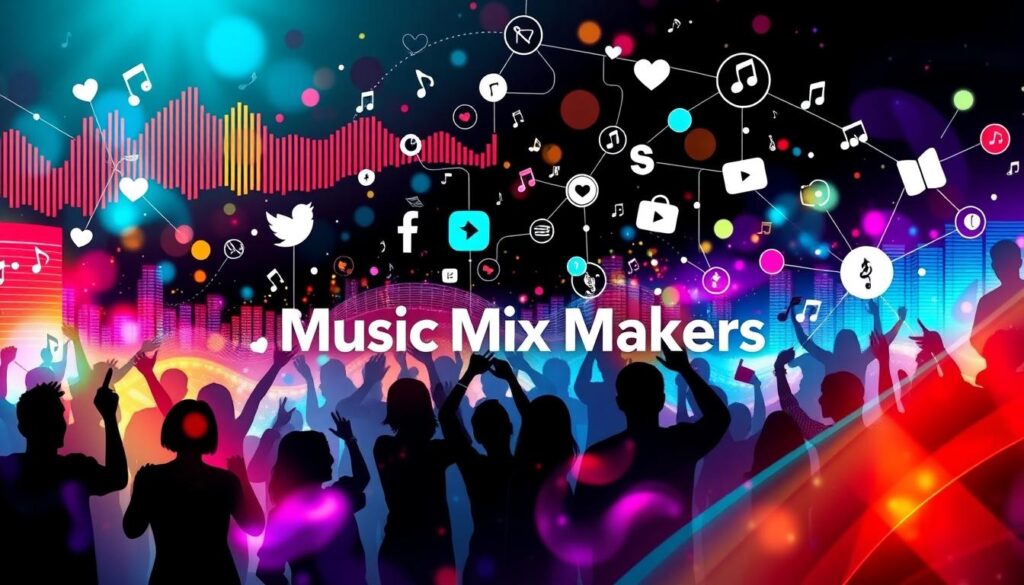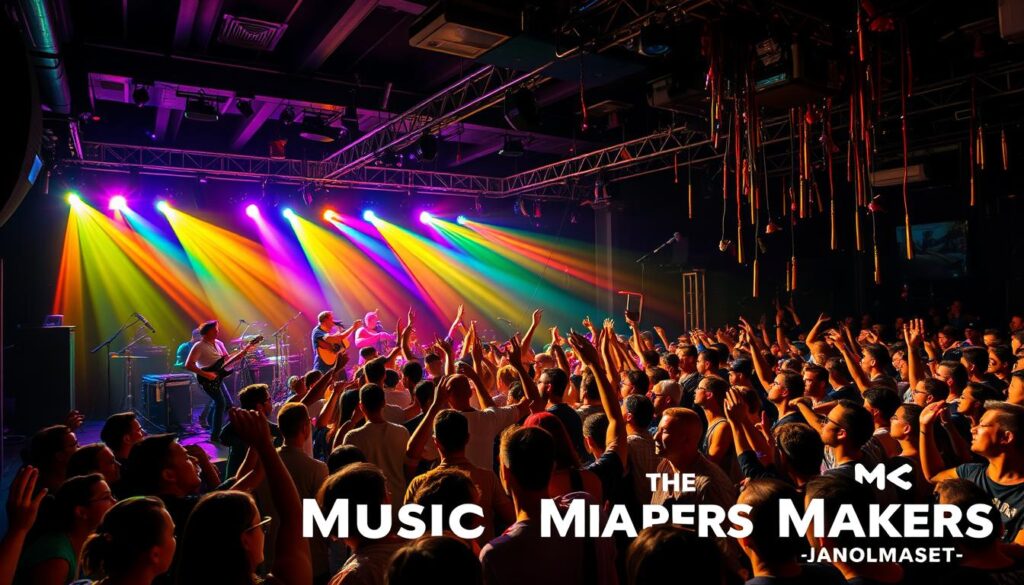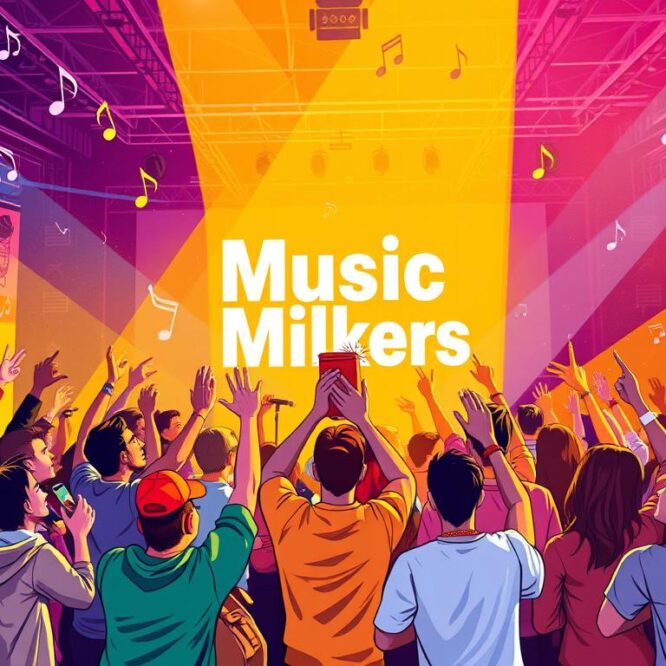As a new artist, building a dedicated fanbase is crucial for your success in the music industry. Cultivating real connections with listeners and turning them into die-hard supporters is the key to a sustainable career. In this article, I’ll share actionable strategies to help you organically grow your fanbase from the ground up.
From defining your unique artist identity and branding to leveraging data and engaging your target audience, we’ll cover the essential tips to aid you in building a strong, loyal community around your music. Whether you’re just starting out or looking to expand your existing fanbase, the insights and tactics I’ll provide will empower you to connect with fans on a deeper level and turn them into your biggest cheerleaders.
Key Takeaways:
- Understand the importance of building a dedicated fanbase as a new artist
- Learn how to define your unique artist identity and create a cohesive brand
- Identify your target audience and develop a strategy to connect with them
- Leverage data and analytics tools to gain insights and optimize your fan engagement
- Consistently create and share engaging content to foster loyalty and community
What is a Fanbase and Why is it Important?
As a musician, your fanbase is the foundation of your success. It’s not just about the number of listeners you have – it’s about cultivating a community of dedicated, loyal fans who actively engage with your music and support your artistry.
Defining Fans and Listeners
While a listener is someone who simply enjoys your music, a fan is someone who feels a deeper connection. They subscribe to your newsletter, follow you on social media, and actively share your content with their friends. Fans are the ones who will attend your live shows, purchase your merchandise, and help spread the word about your music. Building a strong fanbase is crucial for any musician looking to sustain a long-term career.
The Importance of Creating an Emotional Connection
The key to turning listeners into loyal fans is to create an emotional connection with your audience. When fans feel a genuine bond with your music and your brand, they are more likely to continuously engage, support, and advocate for you. Invest time in building authentic relationships with your audience, whether it’s through personalized social media interactions, behind-the-scenes content, or exclusive experiences.
Superfans: Your Biggest Cheerleaders
Superfans are your most dedicated supporters – the ones who consistently follow your every move and are the most engaged with your music and socials. These superfans can become your biggest cheerleaders, spreading the word about your artistry and helping to grow your fanbase organically. Foster a strong relationship with your superfans by offering them exclusive content, merchandise, and opportunities to connect with you directly.
“The relationship with your superfans should be carefully fostered, as it should be a two-way street.”
Remember, a strong fanbase is not just about the numbers – it’s about cultivating a community of passionate supporters who will champion your music and help you achieve long-term success. By focusing on building emotional connections and fostering relationships with your most dedicated fans, you can create a loyal following that will be the backbone of your career as a musician.
Define Your Identity and Branding
As a new artist, one of the most important steps in building a strong fanbase is to take the time to define your unique identity and branding. This involves asking yourself some key questions to help refine your public persona and figure out what makes you stand out in the crowded music landscape.
Key Questions to Ask Yourself
- What is my artist proposition? What do I have to offer that is unique?
- Who am I as an artist? What is my story, my values, and my aesthetic?
- How do I want to be seen in the world? What kind of public persona do I want to cultivate?
- What makes me different from other artists in my genre? What is my competitive advantage?
Answering these questions will help you develop a clear, authentic brand identity that you can consistently communicate across all your marketing and promotional efforts. Remember, everything you do, say, post, and present to the world is an opportunity to tell people who you are.
Examples of Artists with Strong Branding
Looking at how other successful artists have approached developing their identity and branding can provide valuable insights. Some great examples include Paramore, Billie Eilish, Lady Gaga, The 1975, Olivia Rodrigo, Doja Cat, and Taylor Swift. Analyze their strategies, aesthetics, and messaging to understand what works and what doesn’t from a branding perspective.
Establishing a distinct, cohesive brand identity will help you connect with your target audience and stand out in a crowded music landscape. Take the time to get clear on who you are as an artist – it will pay dividends as you work to build a loyal fanbase.
Identify Your Target Audience
As a new artist, it’s crucial to understand who your music is likely to resonate with. Before jumping into promotion, take the time to clearly define your target fan persona. Start by considering demographics like age, location, gender, as well as their interests, values, and personality.
Analyze your musical style and genre to determine who is usually drawn to that type of music. Look at the artists you admire and study what their fan bases typically look like. You can also leverage data tools like Chartmetric and un:hurd music to better understand the demographics and music consumption habits of your target audience.
Taking the time to define your target audience allows you to tailor your brand, messaging, and content strategy to resonate with the people most likely to connect with your music. This understanding of fan demographics and interests is key to building a dedicated fanbase as a new artist.
“Identifying your target audience is the first and most crucial step in developing an effective marketing strategy as a new artist.” – Music Industry Consultant, Jane Doe
| Demographic Factors | Psychographic Factors |
|---|---|
|
|
By taking the time to define your target audience and understand their demographics and interests, you’ll be able to create a more effective and resonant brand and marketing strategy as a new artist. This foundation will be crucial in building a loyal fanbase that truly connects with your music.
Build a Strategy to Connect with Your Target Audience
Now that you’ve defined your target audience, it’s time to start strategically connecting with them. The key is to position yourself in the online communities and platforms where your potential fans are already engaged with content related to your musical style and genre.
Research and Engage in Relevant Online Communities
Explore relevant hashtags, groups, and communities on social media channels like TikTok, Twitter, Instagram, Discord, Reddit, and Facebook. Actively engage with these communities by providing value, building relationships, and fostering a sense of connection with your audience. Look for online forums, blogs, or niche-specific communities that align with your music, and become a contributing member.
Leverage Data and Analytics Tools
Utilize music marketing tools like un:hurd music or Spotify For Artists to track your growth, monitor your playlisting, and gain insights into your listener demographics. This data can help you better understand your target audience and refine your strategy to more effectively connect with them.
Establish an Online Hub (Website)
Creating a branded website serves as your online hub, where fans can easily find and engage with your music and content. As your fanbase grows, more people will be searching for you on Google and social media, so having a centralized, branded web presence is essential. Your website should be the primary destination for fans to learn more about you, access your music, and stay connected.
By strategically engaging with your target audience, leveraging data and analytics, and building a strong online presence, you can start to establish meaningful connections with potential fans and grow your dedicated fanbase.

Consistency is Key: Post Regularly and Keep Content Engaging
As a musician, consistency is crucial when it comes to building a loyal fanbase. While you don’t need to post daily, maintaining a strategic and purposeful content creation schedule is key to keeping your audience engaged and coming back for more. By integrating content creation into your weekly routine, you can ensure a steady flow of high-quality, valuable content that resonates with your fans.
Content Creation and Planning
Set aside 1-2 hours a week to plan and create content for the next few months. This could include scheduling photoshoots, filming behind-the-scenes videos, planning collaborations, or drafting tutorials and educational content. By taking a proactive approach to content planning, you can ensure that you have a diverse array of engaging material to share with your audience on a regular basis.
Posting with Purpose and Meaning
When it comes to posting on social media, consistency is important, but so is posting with intentionality. Avoid simply sharing random content for the sake of being active. Instead, focus on creating posts that provide genuine value to your fans, whether that’s through exclusive announcements, artist vlogs, or tutorials that showcase your expertise. By keeping your content purposeful and meaningful, you’ll encourage your followers to keep coming back to see what’s new.
Fostering Engagement and Loyalty
In addition to posting regularly, it’s crucial to foster a sense of engagement and loyalty with your existing fanbase. Respond to comments, direct messages, and other fan interactions to show that you value their support. Go the extra mile to make your fans feel special, whether through exclusive content, giveaways, or personalized interactions. By creating a strong sense of community, you’ll cultivate a loyal following that will continue to support and grow with you over time.
“Consistency is key when it comes to building a fanbase, but that doesn’t mean you need to post daily. The key is to be strategic and purposeful with your content.”
How to Build a Fanbase as a New Artist
As a new artist, building a dedicated fanbase is essential for your success. One of the most powerful ways to connect with fans and grow your audience is through live performances. Live shows create a unique, immersive experience that can captivate audiences and foster genuine, in-person connections with your supporters.
Live Performances and Real-Life Connections
Live performances offer the opportunity to bring your music to life and create memorable experiences for your fans. Even if you start small with intimate gigs, these in-person interactions can help your audience feel more invested in your journey as an artist. Consider hosting special events like album release parties or pop-up shows to bring your fans together and solidify their loyalty.
Collaborations and Cross-Promotion
Collaborating with other artists is an effective way to expand your fanbase. By tapping into the audiences of your collaborators, whether through guest features, co-written songs, or joint social media posts, you can gain exposure to new potential fans. Additionally, cross-promoting with complementary brands, influencers, or events can help you reach wider audiences and build stronger connections with your target demographic.
Contests and Giveaways
Hosting contests, giveaways, and other interactive fan experiences is a great way to boost engagement and grow your fanbase. Offer exclusive prizes, such as signed merch, backstage passes, or one-on-one video calls, to incentivize fans to participate. This not only helps you build your email list and social media following, but also fosters a sense of community and loyalty among your most dedicated supporters.

“Live performances are the lifeblood of building a fanbase as a new artist. It’s where you can create truly unforgettable experiences and forge real, lasting connections with your audience.”
The Importance of Patience and Persistence
Building a dedicated fanbase as a new artist is a journey that requires patience, consistency, and a long-term mindset. It’s important to understand that growing a fanbase doesn’t happen overnight. It’s a gradual process that involves consistently creating valuable content, fostering genuine connections, and nurturing your superfans.
Don’t get discouraged by slow growth or small numbers in the beginning. Maintaining a positive outlook and trusting the process is crucial. With dedication and authenticity, you can steadily build a loyal following that will support your music for years to come.
Building a fanbase takes time and consistency, so it’s essential to avoid getting caught up in the trap of comparing yourself to others or feeling like you’re not progressing fast enough. Instead, focus on not getting discouraged by slow growth and maintaining a long-term mindset. Consistently provide an exceptional experience for your audience, and your fanbase will grow organically over time.
“The secret of getting ahead is getting started.” – Mark Twain
Remember, the key to building a sustainable fanbase is to approach it with patience and persistence. Stay true to your artistic vision, continue creating high-quality content, and engage with your audience in a meaningful way. By doing so, you’ll lay the foundation for a loyal community that will support your music for the long haul.
Conclusion
In the end, building a fanbase as a new artist is all about forging authentic connections, providing value, and cultivating a sense of community. By defining your unique identity and branding, identifying your target audience, strategically engaging with them online and offline, and consistently delivering high-quality, meaningful content, you can transform casual listeners into dedicated fans who will champion your music.
Remember, the true key to success lies in prioritizing the relationship-building process over vanity metrics. With patience, persistence, and a genuine approach, you can nurture a loyal fanbase that will support your music career for the long haul. The summary of key strategies for building a fanbase, combined with the importance of fan relationships for music career success, will be your roadmap to achieving lasting artistic triumph.
So, keep your focus on creating an emotional connection with your audience, staying true to your artistic vision, and fostering a sense of community around your music. By doing so, you’ll not only build a strong fanbase but also lay the foundation for a fulfilling and sustainable music career.
